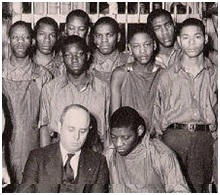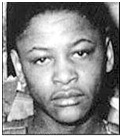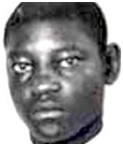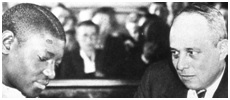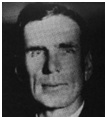|
 |
|
 |
|
|
||
The Scottsboro Boys - Civil Rights and Influence
The Scottsboro Boys
Nine African American youths (pictured right with their lawyer, Samuel Leibowitz), aged 12 to 18. They were wrongly convicted of raping two white women after a fight with white youths on a freight train near Scottsboro, Alabama, on March 25, 1931. They inspired Harper Lee to write To Kill A Mockingbird.
For more detail see... The March on Washington in the History Highlights section.
What happened to them? Four of them were freed in July 1937, including Eugene Williams and Roy Wright (pictured right in 1933), who were only 12 and 13 at the time of the alleged rapes. Charles Weems was paroled in 1943, Ozie Powell and Clarence Norris in 1946, and Andy Wright in 1950. Haywood Patterson, the eldest boy, escaped from prison in 1947 and then lived in Detroit. Patterson was no saint (he was convicted of manslaughter in 1951), but he and the other boys were permanently scarred by the injustice of racism.
Why were they influential?
1. Innocence Who lied about being raped? Victoria Price (aged 21) Ruby Bates (17) (pictured right together in 1931)
Why were they wrongfully convicted ? All white racist juries (racism was rife in southern American states). Countless trials and retrials meant that for years:
“I’d rather die than spend another day in jail for something I didn’t do”, Haywood Patterson (the eldest boy, pictured right) said in 1936. 2. The court case It was the longest case in American legal history and became internationally famous because of its racism. The boys’ defence was financed by the American Communist Party and led by the charismatic lawyer, Samuel Leibowitz (pictured right above with Haywood Patterson in court).
3. Good against evil Good people courageously stood up for the boys in the face of vicious racism. In particular, Judge James Horton (pictured right) rejected the guilty verdict against Haywood Patterson in 1933 and ordered a new trial. “Let justice be done, though the heavens may fall” was Horton's family motto. Horton pleaded with Dr. John Lynch to testify, when the young doctor told him that he thought the two girls were lying. But Lynch didn’t want to sacrifice his career (unlike Horton who lost his job). 4. Civil rights The case:
Key quotes on racism and justice I was framed at Scottsboro, Haywood Patterson. The whole damnable thing was a frame-up of two irresponsible women, Samuel Leibowitz addressing the jury in 1933. I knew if a white woman accused a black man of rape, he was as good as dead, Clarence Norris |
|
|
||
|
|
||
| Copyright © wisdomtowin.com 2025 All Rights Reserved | ||
|


